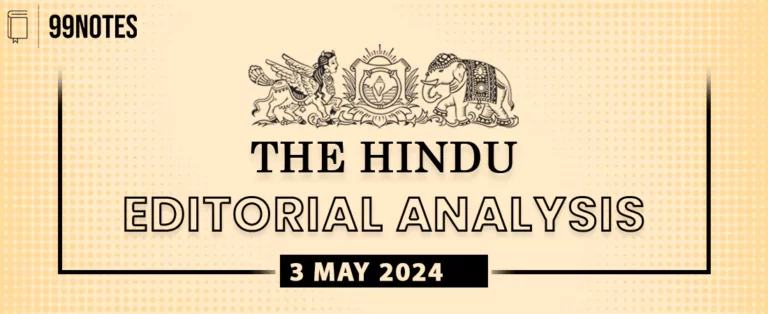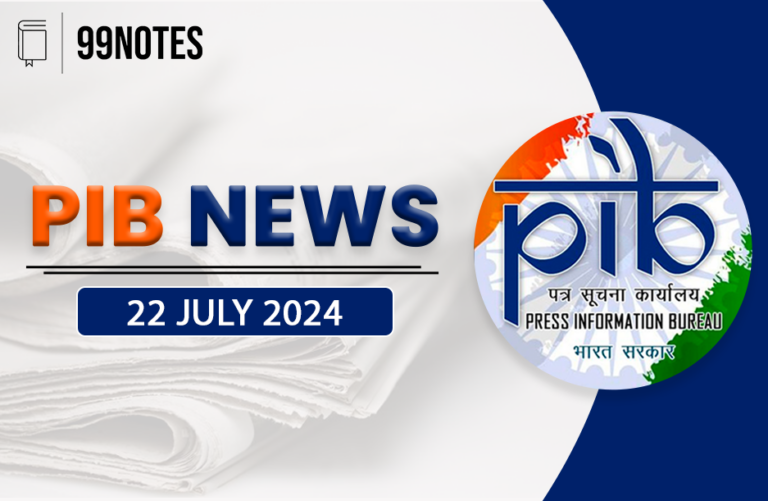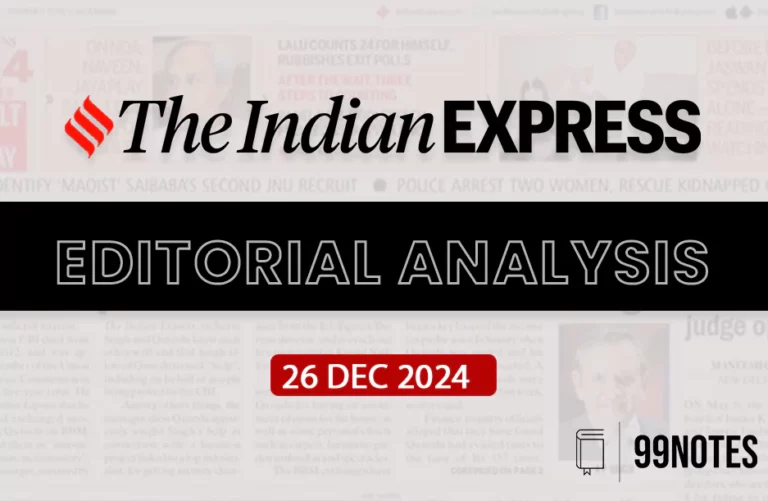19 September 2024 : Indian Express Editorial Analysis
1. One Election, many problems
(Source: Indian Express; Section: The Editorial Page; Page: 12)
| Topic: GS2– Polity |
| Context: |
|
Concentration of Power through Electoral Bonds
- The BJP-led NDA government has been accused of seeking maximum power concentration under the guise of “minimum government, maximum governance.”
- A key example is the introduction of electoral bonds, a system allowing anonymous political donations from corporations. Critics argue that this facilitates quid pro quo arrangements, where businesses fund political campaigns in exchange for favorable policies.
- The Supreme Court of India’s ruling that electoral bonds are unconstitutional further supports the claim that this system undermines voters’ power by prioritizing corporate influence over democratic processes.
- In response, the government has shifted its focus to the One Nation, One Election initiative, which, according to critics, continues the trend of diminishing voters’ choices and agency.
Elections: A Pillar of Democracy
- Elections are integral to democracy as they provide a mechanism for citizens to choose their representatives. However, democracy encompasses more than just elections—it requires spaces for deliberation, accountability, and ongoing engagement with the citizenry.
- One Nation, One Election risks reducing democracy to a transactional event that occurs every five years, with little incentive for governments to remain responsive or accountable in between.
- This system could result in a scenario where citizens are burdened with unpopular governments, without any means of recourse until the next election cycle.
Alleged Benefits of One Nation, One Election
- Supporters of One Nation, One Election often cite the Model Code of Conduct (MCC) as a hindrance to governance, claiming that its frequent imposition slows down decision-making.
- However, critics argue that this issue can be addressed through targeted reforms, such as modernizing MCC guidelines in consultation with stakeholders.
- The Election Commission (EC) could also improve efficiency by reducing the time it takes to conduct elections and better organizing the process.
- Rather than introducing sweeping reforms, a more incremental approach could address existing inefficiencies in the electoral system.
- One suggestion is to cluster state assembly elections to streamline the process without sacrificing the benefits of frequent elections. The primary problem is not the frequency of elections, but the inefficiency in their organization.
Cost Implications and Democratic Values
- Another argument in favor of One Nation, One Election is the potential to save public funds. While cost savings may be a valid concern, critics emphasize that an inclusive and participatory democracy comes with its own expenses.
- In a country of India’s political and economic stature, the focus should not be on cutting costs at the expense of democratic values.
- Instead, attention should be directed toward regulating excessive election spending, which often exceeds legal limits.
Downsides of One Nation, One Election
- The drawbacks of One Nation, One Election are numerous and far-reaching. One key concern is that simultaneous elections could disproportionately benefit dominant national parties, diminishing the influence of regional parties and state-level political dynamics.
- Additionally, if a state government loses public confidence but is forced to continue due to the synchronized election cycle, it could create a situation where democracy becomes subordinate to election schedules rather than responsive to citizens’ needs.
- At the national level, the central government may feel more secure in its position, potentially leading to unresponsiveness and abuse of power. Currently, the need to engage with various constituencies and seek public approval keeps the government in check.
- However, under a One Nation, One Election system, this accountability could be weakened, as the government might focus solely on winning elections, neglecting the needs of the electorate in between.
Conclusion
- While One Nation, One Election may offer some logistical advantages, the potential risks to democracy and political diversity in India far outweigh the benefits.
- The prospect of concentrating power and reducing accountability raises serious concerns about the future of India’s federal structure and democratic ethos.
- Elections are a vital part of democracy, but they must be complemented by ongoing dialogue, accountability, and respect for the voices of all citizens.
- Therefore, the idea of One Nation, One Election should be approached with caution and critical scrutiny to ensure that India’s democratic values are preserved.
.
| What are the Various Benefits of Simultaneous Elections or ONOE? |
|
Reducing Governance Distractions:
Model Code of Conduct’s Impact:
Addressing Political Corruption:
Cost Savings and Electoral Infrastructure:
Citizen Convenience:
Optimizing Law Enforcement Resources:
Curbing Horse-Trading:
Financial Stability for State Governments:
|
| PYQ: ‘Simultaneous election to the Lok Sabha and the State Assemblies will limit the amount of time and money spent in electioneering but it will reduce the government’s accountability to the people’ Discuss. (150 words/10m) (UPSC CSE (M) GS-2 2017) |
| Practice Question: Examine the potential impacts of the “One Nation, One Election” policy on India’s federal structure and democratic values. In your answer, critically analyze both the perceived benefits and the concerns associated with the policy, particularly in terms of electoral accountability and political representation. (250 words/15 m) |




